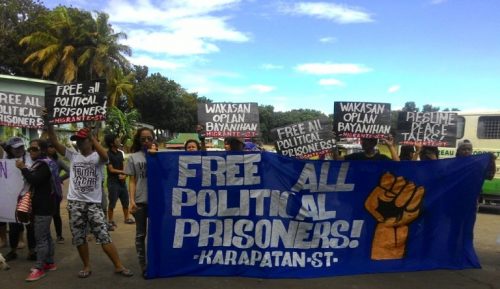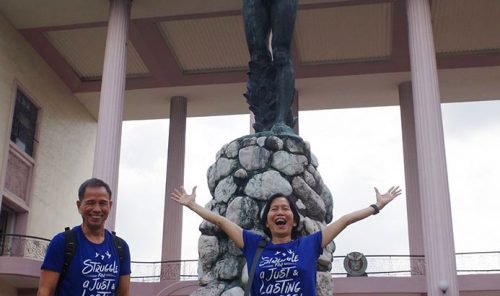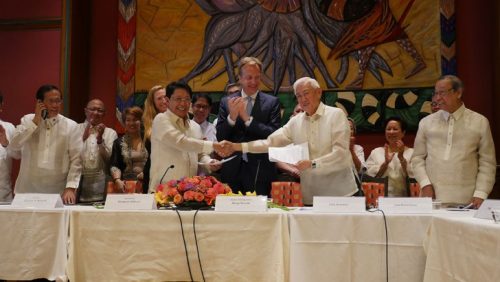Where there is no poverty and oppression –
Where there is no prisoner of political dissent –
There will be peace
Editorial note: This article was first submitted in late 2016 when peace talks were still underway in the Philippines, and has now been revised to include events unfolding as it goes to press in February 2017.
When I was a child, every Christmas I wished for peace in the Philippines. My father was a soldier and was assigned in Mindanao in the south of the Philippines, as well as in other distant provinces that the government saw as hideouts for the rebel groups. He was rarely home over Christmas. He would sometimes be allowed to visit us around New Year’s, but before my birthday came he would have to go back on duty. As a child I thought that when there was peace, when there was no armed conflict, then my father would always be home for the holidays and special occasions.
When I was about 9 years old, one of my mother’s sisters, an activist during Martial Law, was captured by the military and became a political prisoner. Another member of the family was not home for Christmas. I prayed harder for peace in my country and for the release of political prisoners, especially my aunt who then got married and pregnant while in prison.
Years passed, I grew up and started to work for a non-for-profit organization right after I finished my degree at university. My father retired from the military, while I became an activist myself. I still did not celebrate Christmas with him, as my parents eventually separated before his retirement. And sadly, in the last six years, I do not spend Christmas with any of my family members. Economic circumstances have led me to migrate to Canada, many miles away from my home country.
My work with non-government organizations in the Philippines paved the way for my political awakening. I learned that the daily, systematic and systemic injustices experienced by people drive them to seek fundamental changes in society through a variety of means. Many Filipinos in the last four decades have embraced armed struggle to overthrow the ruling system.

Political prisoners in the Philippines started their fast to protest their continuing detention, while their families and relatives joined nationwide demonstrations to clamour for the immediate release of all political prisoners. Photo by Bulatlat.com
Contrary to my childhood belief that they were the enemy, grassroots work taught me that these rebel groups arise to seek political and socio-economic reforms for the benefit of all Filipinos, especially the marginalized and oppressed. Because of my involvement in development work, I have seen how conflicts arise from conditions of poverty, inequity and repression. I understand how these three conditions have affected the lives of the majority of Filipinos for many decades.
Indeed, the Philippine economy remains controlled by a few. Recent data from the IBON Foundation (“Filipinos denied economic, social and cultural rights,” December 2016[i]) reveals that the wealth of the 10 richest Filipinos grew by 220% from 2010 to 2015, while the net income of the top 1,000 corporations grew by 41% from 2010 to 2014. The Filipino majority remains poor. Their average daily basic wage increased by just 5.3% between the same periods. Unemployment has been a continuing crisis, with 4.3 million people unemployed. In the countryside, landlords still own more than 80% of the agricultural land, some 2.4 million farms rely on hand tools, ploughs and carabaos (water buffalos), and only 30% of the total farm area is irrigated. Almost 97% of elderly Filipinos do not receive decent pensions, while 22% of children under the age of five are malnourished. About 46% of all Filipino households are incapable of providing their children with an adequate and nutritional diet. Access to health, education and housing remain elusive.
In May 2016, the Filipino people elected President Rodrigo Duterte, who calls himself a socialist. A majority of Filipinos believed he could bring change as he promised reforms in the government. President Duterte is very vocal about his sympathy for the left, has appointed progressive left-wing people in his cabinet, and has reached out to the left by initiating the resumption of the peace talks. He promised to release all political prisoners and declared a unilateral ceasefire during his first State of the Nation Address in July 2016.
In August 2016, the Government of the Republic of the Philippines (GRP) and the National Democratic Front of the Philippines (NDFP) resumed peace talks, which opened with a positive atmosphere at the negotiating table and continues to make strides.
The resumption of the peace talks is a significant move to broaden and strengthen support for the Filipino people’s desire for a just and lasting peace. The four-decade-long armed conflict between the government and New People’s Army (NPA), the armed wing of the National Democratic Front, has claimed an estimated 120,000 lives and displaced some two million people since the late 1960s. The Communist Party of the Philippines (CPP) was founded in 1968, and the New People’s Army (NPA) in 1969 raised the banner of a protracted people’s war rooted in a deep commitment to resolve the fundamental problems of poverty, landlessness, joblessness, social injustice and various forms of oppression and exploitation.
The Filipinos have been fighting for genuine independence since Spanish colonization in the 16th century. However, since Spain sold the Philippines to the United States under the Paris Treaty in 1898, the US has maintained its military presence and imposed economic agreements that have prevented the Philippines from achieving self-sufficient development and genuine democracy. The US has always been interested in exploiting the abundant natural resources and cheap labour of the Philippines, capturing a large market for American products, and maintaining naval and air bases there, given the Philippines’ strategic location in the Pacific region for US military operations.

Released in August 2016, former political prisoners Wilma Austria Tiamzon and Benito Tiamzon went back to the University of the Philippines where their political awakening began. Photo by Bulatlat.com
Leftist opposition to US imperialism led to a growing revolutionary armed struggle in the countryside and an underground revolutionary mass movement in the cities. President Ferdinand Marcos then declared martial law in 1972, which resulted in an estimated 70,000 cases of political detention, 34,000 cases of torture and more than 3,000 extrajudicial killings, according to Amnesty International. Even after martial law was lifted in 1983 and Marcos was ousted in 1986, the counter-insurgency war of successive presidents perpetuated the abuses, with countless cases of gross human rights violations, political assassinations and internal displacements involving thousands of people. The peace talks were an attempt by the government to merely neutralize armed groups without addressing the roots of the problem. In short, they were superficial peace negotiations.
Discussions on economic and social reforms were at the heart of the first round of the peace talks under the government of President Duterte. Preliminary meetings were held between the government and the National Democratic Front, and the aim was to come with substantial agreements, including the Comprehensive Agreement on Social and Economic Reforms (CASER).
Confidence-building measures such as the release of political prisoners were also discussed in the peace talks. This was a positive development and an important step toward normalizing relations between the National Democratic Front and the government. The National Democratic Front stated that granting amnesty and freedom to political prisoners would restore the political rights of these people and affirm their civil liberties and human dignity.
Dropping charges against political activists and releasing political prisoners would prove that the new government was willing to carry out reforms. This would also be in compliance with signed agreements such the Joint Agreement on Safety and Immunity Guarantees (JASIG) and the Comprehensive Agreement on Respect for Human Rights and International Humanitarian Law (CARHRIHL).
At present, there are still more than 500 political prisoners in the Philippines. In August 2016 for the first round of peace talks, there were 17 National Democratic Front advisors and two political prisoners freed on humanitarian grounds. As the peace negotiations continued, the National Democratic Front called on President Duterte to immediately release all political prisoners as promised, with priority given to those who were sick or elderly, as a condition for a bilateral ceasefire.
As year 2016 ended, chaos erupted at the peace negotiations table. President Duterte had issued statements asserting that he would only release the political prisoners after a bilateral ceasefire agreement had been reached with the National Democratic Front, contrary to his earlier pledge to grant them general amnesty immediately after his election as president earlier that year.
In an interview conducted by Kodao Productions with the National Democratic Front’s chief advisor, Jose Maria Sison, the latter indicated that the Central Committee of the Communist Party of the Philippines was ready to terminate the August 28, 2016 unilateral declaration of an interim ceasefire should the government fail to declare amnesty and release all political prisoners in December or January 2017.

Members of the Philippine peace negotiations team representing the government and the National Democratic Front in Oslo, Norway last August 2016, in initial discussions on socio-economic reforms, political and constitutional reforms, and an end to hostilities and the deployment of troops. The third round of peace talks under the Duterte administration was set to resume in January 2017. Photo by Bulatlat.com
Sison made it clear that signing the bilateral ceasefire agreement by the government’s and the National Democratic Front’s negotiating teams could precede the implementation of amnesty and the release of all political prisoners by President Duterte, but specified that ”the agreement only becomes valid and effective upon the actual release of political prisoners and the approval of the agreement by the designated government and National Democratic Front representatives.”
In a surprising turn of events this February, President Duterte called for the peace talks and the ceasefire to be terminated, effective February 10. There have been reports of attacks on activists and suspected rebels have occurred in the country.
Given the president’s apparent change of heart about the release of political prisoners, his suspension of peace talks and the ceasefire, and the many other issues that surround his presidency, is there really any prospect of peace brewing in the Philippines now? In the first place, the political prisoners should not be treated as pawns or hostages in these peace talks.
Meanwhile, President Duterte’s brutal war on drugs has unleashed the police and the military, and the vast majority of its victims are not drug lords but poor people, along with petty drug users and dealers. Similarly, opponents of the mining companies and of the government’s ongoing neo-liberal policies are still being met with repression and military violence. The left is waging the fiercest opposition to such policies and such repression.
The National Democratic Front, on the other hand, is still asking President Duterte to reconsider his suspension of the peace talks, to find a just and lasting solution to the 47-year armed conflict. It is still calling for the release of all political prisoners, and arguing that the absence of a ceasefire should not be seen as an excuse for renewed violation of human rights, especially of the already oppressed and marginalized farmers and indigenous people.
=========
I unequivocally believe that peace is not simply the absence of war, in the Philippines or elsewhere in the world. Genuine and lasting peace is the absence of poverty, inequity and repression. Will there really be a just and lasting peace at this time of crisis in global capitalism?
I believe there will be peace:
… where there is real development that is not just for the profits of big companies or landlords
… where there is land owned by the farmers who till it
… where there are jobs generated through the country’s own industry that is abundant enough to provide an option to would-be migrant workers
… where there are just wages to meet the daily cost of living for the whole family
… where there is access to health care, including free hospital care
… where there is access to free education to give people the chance to contribute their skills to the development of the country
… where there is decent housing that is affordable for poor people
… where there is equality, with no discrimination based on gender, religion or ethnicity
… where there is national sovereignty and autonomy in foreign relations.
References used for the article were from various articles from the websites of the National Democratic Front, the IBON Foundation, Bulatlat, and Kodao Productions, which are all progressive organizations based in the Philippines.
[i] http://ibon.org/2016/12/filipinos-denied-economic-social-and-cultural-rights/










